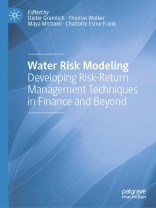This book sheds light on the topic of financial water risk by examining the modeling challenges associated with physical, regulatory, and reputational water risk in finance. It explores various approaches to operationalize water risk from a financial analysis, investment management, and climate science perspective. The analysis of tools to assess water risk provides the basis for the development of appropriate risk-return management techniques in finance and beyond. This book provides new insights by focusing on financial water threats and their related opportunities. It will be of interest to both academics and practitioners who work at the interface of finance, economics, nature, and society.
Tabela de Conteúdo
Chapter 1: Introduction.- Part I: Framework of Financial Water Risk.- Chapter 2: Drivers of water risk and their interaction.- Chapter 3: Water risk and climate change.- Chapter 4: Interaction effects of water risk in finance and society.- Chapter 5: Opportunities from water risk.- Part II: Modeling Financial Water Risk.- Chapter 6: Presentation of specific water risk models (different chapters).- Chapter 7: Financial water risk and accounting/risk reporting.- Chapter 8: Water risk stress testing.- Chapter 9: Modelling financial water risk approaches using neural networks, artificial intelligence, and other advanced methods.- Part III: Managing Financial Water Risk.- Chapter 10: Financial water risk and the use of data science (e.g., advances in high-resolution geo-mapping).- Chapter 11: Water risk governance of companies and countries.- Chapter 12: Water risk insurance.- Chapter 13: Water risk derivatives.- Chapter 14: Water risk management of investment portfolios.- Chapter 15: Directions in water risk regulations.- Chapter 16: Conclusions.
Sobre o autor
Dieter Gramlich is a Professor at DHBW – Baden-Wuerttemberg Cooperative State University in Heidenheim, Germany, where he serves as Head of the Banking Department. He previously studied at the University of Mannheim and was an interim professor and Chair of Banking & Finance at the University of Halle. His research focuses on sustainable finance.
Thomas Walker is a Professor of Finance and Concordia University Research Chair in Emerging Risk Management at Concordia University, Montreal, Canada. Prior to academia, he worked in the German consulting and industrial sector at Mercedes Benz, Utility Consultants International, Lahmeyer International, Telenet, and KPMG Peat Marwick.
Maya Michaeli works as a Research Associate in the Department of Finance at Concordia University, Montreal. She has a natural passion for financial markets and the future of sustainable investments and has participated in numerous research projects in those areas.
Charlotte Esme Frank completed her Bachelor’s degree in the Humanities at Carleton University, Ottawa. She holds an MA in English Literature and Creative Writing from Concordia University, Montreal, where she is a Research Associate at the John Molson School of Business. She is currently completing a Ph D in English literature at Mc Gill University.












